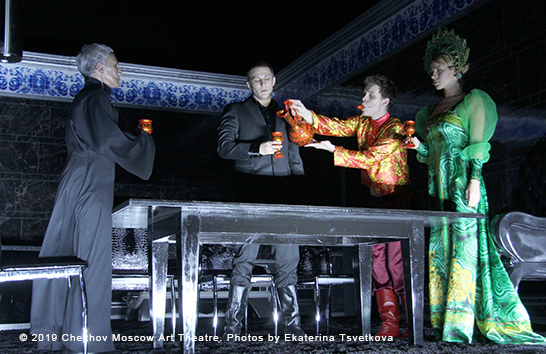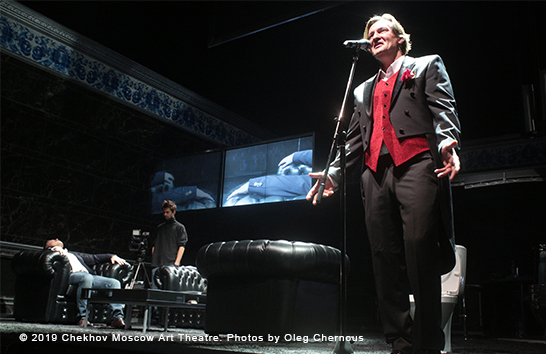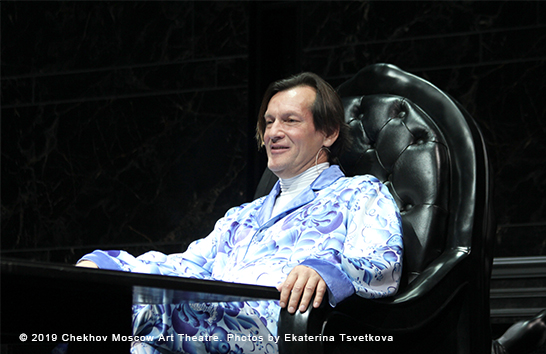Russia
Chekhov Moscow Art Theatre?
Directorial Creation of K. Bogomolov, based on the novel by F. Dostoevsky
WHEN:
November 1, 2019, 18:00
November 2, 2019, 18:00
November 3, 2019, 13:00
WHERE: Wuzhen Grand Theatre
Duration: 285 minutes (with two intermissions)?
Performed in Russian, with Chinese and English subtitles

Reviews
Bogomolov strives to show the world even scarier and darker than it is, to ridicule his and our phobias, to bring them to the absurdity level, to arrange a grotesque carnival, and to convert the whole thing into a collective psychotherapy.
– Marina Shimadina, Izvestia
The Karamazovs? for the director is entered into the bones of Russian life habit of voluptuous self-torment and torment of loved ones, lustful passion for crime, covered with a sugar-coated layer of hypocritical piety.
– Alena Karas, Rossiyskaya Gazeta
Alyosha Karamazov is a true saint in The Karamazovs. The eternal Russian boy, he saw all the horror of this world and aged instantly, having no time to grow up. Bogomolov’s production, as paradoxical as it sounds, is staged from Alyosha’s point of view.
– Nikolai Berman, Gazeta.ru
The Karamazovs is not about Russian life, as it may appear at first. It is about just life. One can discover absolutely Hamletian motives in this production. Just as the Shakespearean tragedy, Bogomolov’s production revolves around the mortal coil and the molten human flesh.
– Marina Davydova, Colta.ru

About The Karamazovs
This production tries to cover [Dostoevsky’s] entire novel, but the love lines here are reduced and the idea of metaphysical confrontation between fathers and sons, the original struggle for a place under the sun, comes to the fore. That's why they don't have old people and children here, and Fyodor Pavlovic is a full-fledged man.
There are no blessed saints here, although Alyosha has always been played that way. But in the novel Alyosha is a madman, as Fyodor Pavlovich says. Bogomolov is very interested in the demonic nature of religious searches, the inability to find God in the space of the modern world. He is present in this space, only it is impossible to find Him, as it is too dark. That's why the scenic space is a black box. One can call it the “Russian space,” or “the space of Earthly Life.” Although, of course, the motive of the Russian national is very important to them. For the demons that roam here are demons of national character, and Alyosha himself carries a strange combination of holiness and demonism.
Equally important to Bogomolov is the motive of children’s revenge for their father, realized through Smerdyakov. An illegitimate son with a “divine disease” (the same disease Myshkin had in The Idiot), Smerdyakov is an angel of revenge for his mother, Elizaveta the Stinky.
As for the theatrical form, the production swings from the theater of conditional-psychological to completely conditional; from trash and parody using elements of pop culture or openly folk inflections to high dramatic monologues; from comics and phantasmagoria to frank grotesque and traditional stage narrative.
The Karamazovs is an attempt to make a spectacle out of Dostoevsky. For he himself, according to Mikhail Bakhtin, was able to pack metaphysics into the pulp fiction format, using the schemes of the tabloid novel, addressed to the general public.

Credits
Director: Konstantin Bogomolov
Set Design: Larisa Lomakina
Lighting Design: Damir Ismagilov
Video Design: Alexander Simonov
Stage Manager: Irena Arkhangelskaya
Performers:
Igor Mirkurbanov – Fedor Pavlovich Karamazov
Roza Khairullina – Alexey Fedorovich Karamazov
Philipp Yankovsky – Dmitry Fedorovich Karamazov
Alexey Kravchenko – Ivan Fedorovich Karamazov
Victor Verzhbitsky – Smerdyakov & Zosima
Darya Moroz – Katya-the-Bloodsucker
Aleksandra Rebenok – Grushen'ka-with-Laughter
Marina Zudina – Khokhlakova-the-Moneybox
Nadezhda Kaleganova – Liza-the-Stock
Kirill Vlasov - Perkhotin, Miusov, Expert, Professor & Pathologist
Pavel Chinarev – Mechanic Cops, Monks, Bodyguards of the Handicapped,
Kalinka-Malinka, Special,
Love & Innkeeper
Danil Steklov – Mechanic Cops, Monks, Bodyguards of the Handicapped,
Kalinka-Malinka, Special,
Love & Innkeeper
Nadezhda Borisova - Mama, Vera, Woman-Who-Lost-Her-Son & Cop Diva and
Simply the Diva
Maria Karpova - Mama, Vera, Woman-Who-Lost-Her-Son & Cop Diva and Simply the
Diva
Uliana Glushkova - Father Feofan
Artem Panchyk - Left Eye
Vladimir Panchyk - Right Eye
Devil - Is Here
Chinese script translator: Yuan Tinglei

About Konstantin Bogomolov
Graduate of the Moscow State University School of Philology (1997) and the Russian Academy of Theatre Arts School of Directing (2003), he directs both nationally and internationally. He directed Il trionfo del Tempo e del Disinganno?by Handel at the Stanislavsky & Nemirovich-Danchenko Musical Theatre. ?Among his credits at the Chekhov Moscow Art Theatre (where he directs since 2011) are The Event by Nabokov, An Ideal Husband. A Comedy based on Wilde, The Musketeers. Saga. Part One based on Dumas, Jeweler's Jubilee by MacAuliff, Central Park West and Husbands and Wives?by Woody Allen, The Dragon by Schwartz, The Three Sisters by Chekhov. His recent productions include Agamemnon Is My Father by Euripides at the Vilnius Maly Theater, Ice by Sorokin at the National Theater in Warsaw, Boris Godunov by Pushkin?and Prince by Dostoevsky at The Lenkom, Gargantua and Pantagruel by Rabelais at The Theater of Nations, Platonov by Chekhov at the Stary Teatr in Krakow, The Glory by Gusev at the Bolshoi Drama in St. Petersburg, Crime and Punishment by Dostoevsky at the Comedians’ Refuge in St. Petersburg. Winner of the numerous Russian and international theater awards, he was recently appointed Artistic Director of the Malaya Bronnaya Theatre in Moscow.

About Chekhov Moscow Art Theatre
The Moscow Art Theatre came into existence in 1897 thanks to the joint efforts of actor/director Konstantin Stanislavsky and playwright/acting teacher Vladimir Nemirovich-Danchenko. The Seagull by Anton Chekhov was part of the first season, and became the company’s signature piece and its logo.
Moscow Art Theatre is a birthplace for the best 20th century playwrights (Anton Chekhov, Maxim Gorky, Mikhail Bulgakov among others), actors and directors (Vsevolod Meyerhold, Michael Chekhov, Yevgeny Vakhtangov to mention a few). ?A two-year-long tour of Europe and the US in 1922-1924 made the company a true world treasure. ?It was during this tour that the Stanislavsky system, known as the Method in the West, became the golden standard of actors’ training worldwide. In 1943 the theatre entrusted further development and dissemination of its methodology to the newly established Moscow Art Theatre School. The School remains to date one of the leading theatre training programs in the world.
Oleg Yefremov, who graduated from the School in 1949, became the Moscow Art Artistic Director in 1970. True visionary and outstanding actor/director he chaired the company for thirty years and assembled here the best artistic talent of his time. ?Leading the company into the 21st century was Oleg Tabakov, Producing Artistic Director from 2000 to 2018. ?Under his stewardship the theatre successfully developed a diverse repertoire, both classical and contemporary, and opened its doors to the new generation of directors, such as Kirill Serebrennikov and Konstantin Bogomolov, as well as new playwrights, designers and composers.
In April of 2018 Sergei Zhenovach, prominent theater director and professor of acting/directing, who is also the founder of the Studio of Theatre Art, was appointed the new artistic director.








